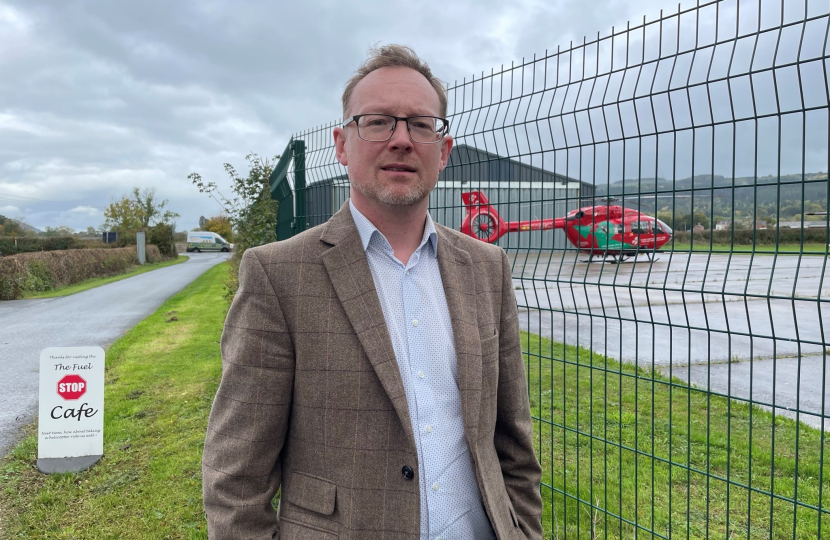
Campaign to Save Welshpool’s Wales Air Ambulance Base
Updated: January 2025
The proposed closure of Air Ambulance Bases was challenged at a Court Hearing in January 2025.
I believe that the decision taken by the NHS Wales Joint Commissioning Committee (JCC) last year, to permanently close and centralise the Welshpool and Caernarfon Air Ambulance bases, was fundamentally wrong. The campaign group that I am part of has been working to challenge this decision. As campaigners we have argued that the reconfiguration will lead to slower response times for critical care in rural areas.
We in Mid Wales rely on the service of the Wales Air Ambulance to attend and treat people at a scene, and to ensure people are transferred to receive further critical care treatment in a timely manner. The Air Ambulance is a lifeline for rural Wales, and the closure of the Welshpool base would be a devastating blow.
Following an application for Judicial Review that was issued at the High Court last year, a hearing took place on Wednesday 22nd and Thursday 23rd January in Cardiff. The hearing will continue on Friday 7th February.
The legal team challenged the lawfulness of the NHS Wales Joint Commissioning Committee’s decision to adopt recommendations which would see changes to the Emergency Medical Retrieval and Transfer Service, including the permanent closure of Air Ambulance bases in Welshpool and Caernarfon. The JCC is a Commissioning Committee made up of the seven Health Boards across Wales who act collectively to facilitate and manage the healthcare system.
As part of its decision the JCC also recommended implementing a ‘special emergency road service’ using Rapid Response Vehicles (RRVs) as an alternative. Not only would this option be deeply unsatisfactory and inadequate for a rural area like Montgomeryshire, but there is also no detail on how it would operate or be funded. The JCC’s proposal is both impractical and poorly conceived. One extreme weather event or road closure could severely impact the ability of RRVs to reach patients in need of urgent critical treatment, and this could have catastrophic consequences. Despite the JCC’s agreement to deliver a detailed implementation plan by the end of September 2024, little information has yet been published.
The hearing offers an opportunity to scrutinise the JCC’s decision, with legal representation provided by Watkins & Gunn’s Human Rights and Public Law team. As campaigners we hope the challenge will bring transparency and lead to a reversal of the controversial plans. Our legal team that that we have been working with argued that the JCC’s decision lacked transparency, failed to consider the unique needs of rural communities, and challenged the process that led to the decision.
I believe that the proposals to the close the Air Ambulance’s base in Welshpool were based on flawed information, and that the process has been filled with bias, misinformation and misdirection. The legal team presented these arguments.
It is of course not possible to say if the legal challenge will be successful. The judge will continue to hear the arguments, and will make a determination at a later date. Based on the evidence, research and the work of the campaign team - and working alongside the legal team presenting the case - there is good reason to feel positive about the outcome of the challenge.
I have been impressed with legal firm Watkins and Gunn, and let’s remember that being allowed the opportunity to present at a hearing demonstrates that a judge considered the case to have merit in the first place. We in Mid Wales are not asking for preferential treatment, we are asking for fairness. The people of Mid Wales deserve the same standard of care as those in urban areas.
I have continued to raise this issue in the Senedd as I firmly believe the Welsh Government, who are ultimately responsible, should intervene and call the proposals in for a decision by Welsh Government Ministers.
I want to thank everyone who has contributed to this fight, whether through signing petitions, fundraising, or voicing support for the campaign team. I’d also like to thank the legal team at Watkins & Gunn.
We now wait for the judge to make a determination.
